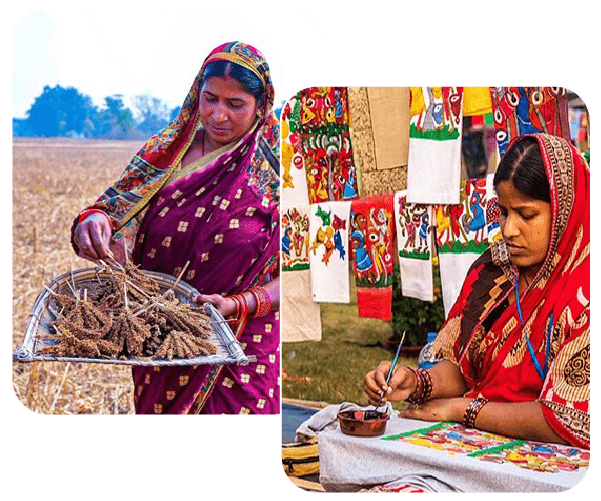Supporting Entrepreneurs Beyond Funding CHALLENGES & PROBLEMS FACED BY ENTREPRENEURS
Apparent Problems (Tangible)
- Marketing and Market Access
- Branding
- Printing, Packing and Packaging
- Affordable Logistics
- Market Intelligence
- Affordable Insurance
- Quality Control, Standardization, Uniformity, Finishing Scalability
- Soft Skills, Communication, Public Speaking Phobia Lack Of Confidence
- Non-Access To Cheap Inputs
- Financial Literacy Banking, Legal ,Accountancy, Exports, Taxation, Govt Schemes
- Cultural Barriers
- Time and Family Constraints


Intangible Challenges Based On Our Own Research
- Disjointed & Piecemeal efforts Lack of holistic approach
- Lack of proper hand holding for appropriate period of time
- Lack of Congenial Eco system for developing,grooming,Nurturing entrepreneurs
- Equating skill enhanced training with entrepreneurship.
- Entrepreneurs & SHGs need to be nurtured over time.
- Funding SHGs does not solve their problems
- A holistic approach is required to prevent the waste of money
- Skill enhancement training given by everyone but THE ENTREPRENEUR
- Teacher-trainers, professor-trainers, state government officials, bankers, consultants, trainers with no business background are providing training
- Lack of market access is a major cause of business failure.
- Our focus on this area will be our biggest contribution.

SELF HELP GROUPS (SHGs)
Self help groups(SHGs) and peer-managed collective of individuals from comparable socio-economic backgrounds engaging in income-generating activities to reduce poverty, promote financial inclusion, achieve economic independence, and empower women.
OUR SOLUTION TO SHGs
The SHGs will be connected and integrated with this giant network of entrepreneurs who will provide them with PEDAGOGICAL SUPPORT to solve their problems, gain market access, and grow their businesses.
We offer a platform where entrepreneurs come and meet on
![]() Regular basis build strong relationships
Regular basis build strong relationships
![]() Share their problems, challenges, hardships, requirements
Share their problems, challenges, hardships, requirements
![]() Help each other to find out possible solutions which includes giving connects to business opportunities and market access.
Help each other to find out possible solutions which includes giving connects to business opportunities and market access.
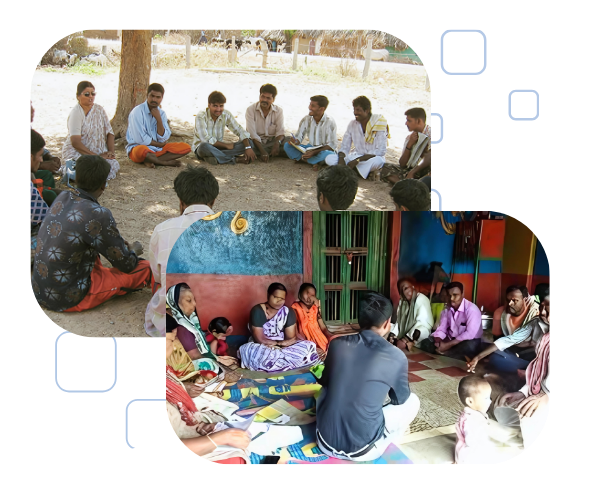
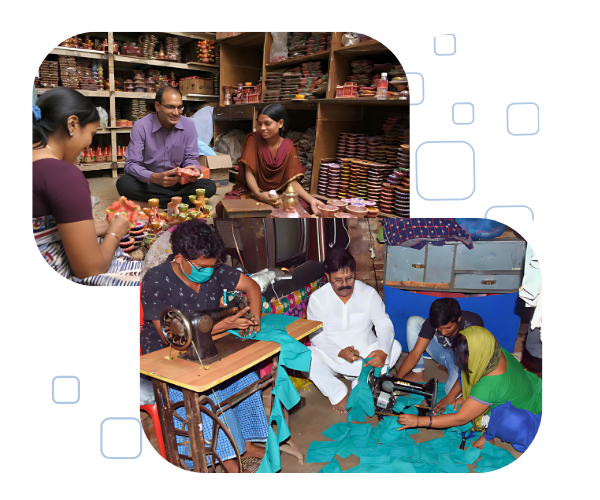
Start Ups
Start-ups in rural areas led by women entrepreneurs can have a significant impact on the local economy and the empowerment of women. These start-ups can provide employment opportunities and increase income levels for the local community while also promoting gender equality and women's rights.
However, women entrepreneurs in rural areas face several challenges such as lack of access to finance, technology, and education. Therefore, it is essential to provide support through various government schemes, financial institutions, and mentorship programs to ensure that these women entrepreneurs can overcome these obstacles and succeed in their ventures. Additionally, there is a need to create awareness about entrepreneurship and encourage more women to take up entrepreneurship as a viable career option in rural areas.
Exporters
Exporters in rural areas led by women entrepreneurs can play a crucial role in boosting the local economy and creating employment opportunities. These women-led exporters can tap into local resources, skills, and traditional knowledge to produce unique products with cultural value, which can attract international buyers.
However, women entrepreneurs in rural areas face several challenges, such as lack of access to information, market linkages, and finance, which can hinder their growth and success in the international market. Therefore, it is crucial to provide them with the necessary support through training, capacity building, and access to finance and technology to help them improve the quality of their products and reach a wider audience. Additionally, creating a network of women entrepreneurs can help them share their experiences, knowledge and provide them with access to market linkages, which can be a significant boost to their exports.
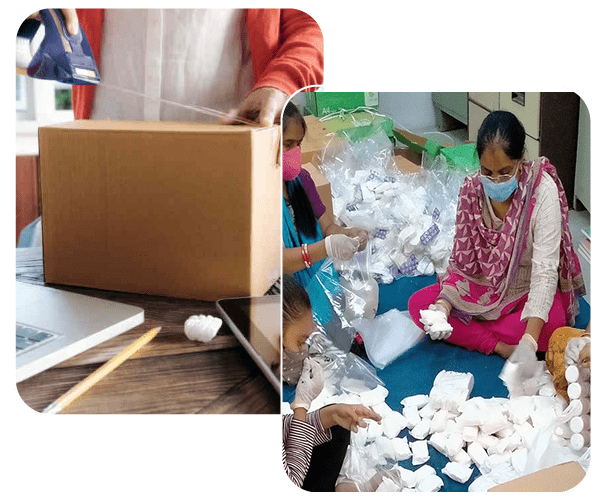
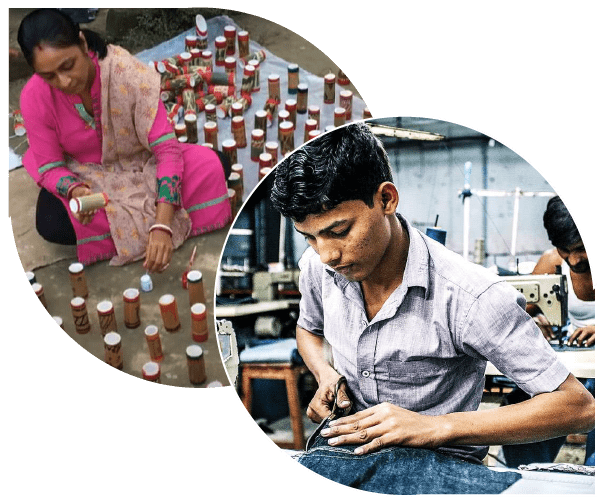
MICRO, SMALL AND MEDIUM ENTERPRISES (MSMEs)
- Contribution 33% of Manufacturing MSMEs in the country’s total GDP
- MSME Sector as of the estimated number of 633.92 lakh enterprises
- 34.8 million establishments (59.48%) were found in rural areas and nearly 23.7 million establishments (40.52%) were found to be located in urban areas.
- 45% of industrial production
- 30.5% of services sector
- Employing close to 110 million people.
- MSME related products in the country exports was 48.56% during 2017-18
- Important role in making India a manufacturing hub and “Make in India” campaign a success.
Farmer Producer Companies
Farmer Producer Companies (FPCs) led by women entrepreneurs in rural areas can have a transformative impact on the lives of smallholder farmers. These FPCs can provide a platform for women farmers to come together, pool their resources and knowledge, and collectively market their produce.
However, women entrepreneurs in rural areas face several challenges, such as lack of access to finance, technology, and information, which can hinder their participation in FPCs. Therefore, it is essential to provide them with the necessary support through training, capacity building, and access to finance and technology to help them improve the quality of their produce and reach a wider market. Additionally, creating awareness about the benefits of FPCs and encouraging more women to participate can promote gender equality and women's empowerment in rural areas, while also contributing to the growth of the local economy.
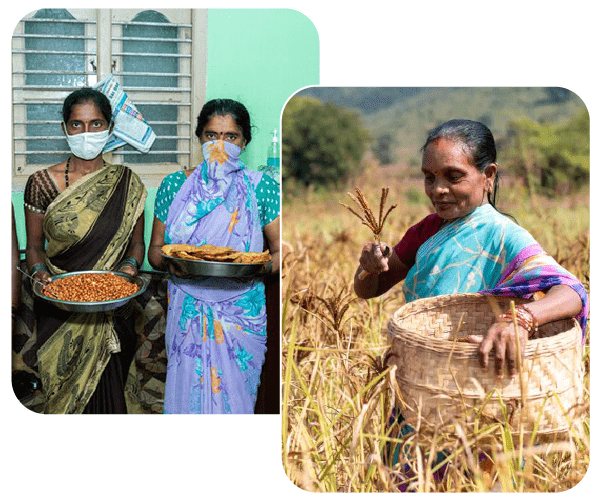
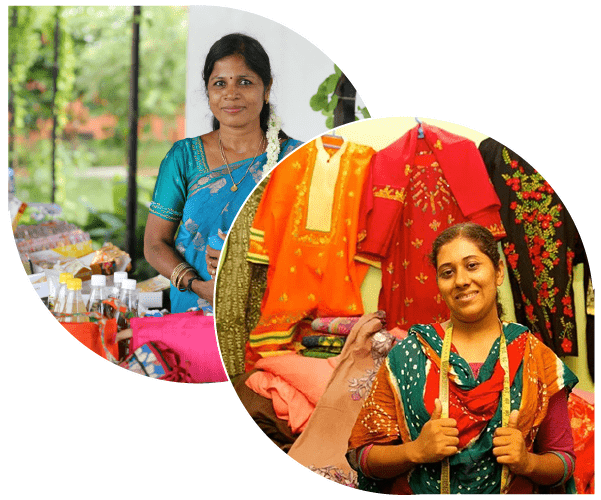
Women Entrepreneurs
Women entrepreneurs in rural areas play a vital role in the economic development of their communities. These women entrepreneurs can bring in innovative ideas, create job opportunities, and promote gender equality and women's empowerment. They can also leverage local resources, skills, and traditional knowledge to develop unique products and services, which can cater to both the local and international markets.
However, women entrepreneurs in rural areas face several challenges, such as lack of access to finance, technology, and education, which can hinder their growth and success. Therefore, it is crucial to provide them with the necessary support through training, capacity building, and access to finance and technology to help them overcome these obstacles and succeed in their ventures. Additionally, creating a network of women entrepreneurs can help them share their experiences, knowledge and provide them with access to market linkages, which can be a significant boost to their businesses. Encouraging and empowering more women to become entrepreneurs can also contribute to the overall development of the rural economy.
Dalit SC/ST Entrepreneurs
Dalit SC/ST entrepreneurs in rural areas can play a vital role in promoting social and economic inclusion and breaking the cycle of poverty in their communities. These entrepreneurs can create employment opportunities and provide goods and services that meet the needs of the local population. Moreover, they can leverage their unique perspectives and experiences to develop innovative products and services that cater to both local and international markets.
However, Dalit SC/ST entrepreneurs in rural areas face several challenges, such as discrimination, lack of access to finance and education, and limited market opportunities. Therefore, it is crucial to provide them with the necessary support through affirmative action policies, access to credit, and training to help them overcome these challenges and succeed in their ventures. Additionally, creating a network of Dalit SC/ST entrepreneurs can help them share their experiences, knowledge, and provide them with access to market linkages, which can be a significant boost to their businesses. Encouraging and empowering more Dalit SC/ST women to become entrepreneurs can also promote gender equality and social justice in rural areas.

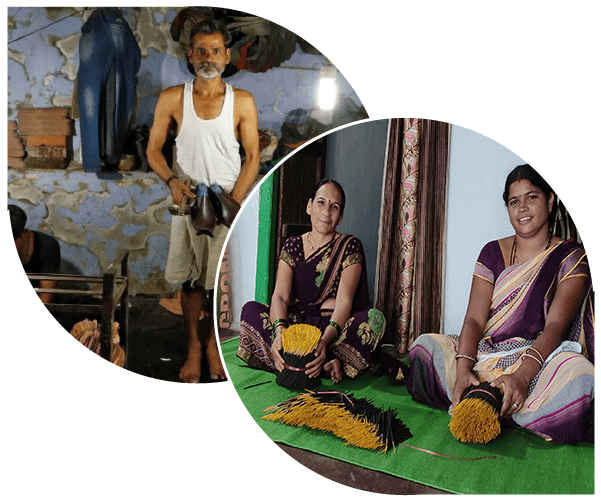
OBC-backward Entrepreneurs
OBC-backward entrepreneurs in rural areas can play a significant role in promoting economic development and social inclusion in their communities. These entrepreneurs can leverage their local knowledge, resources, and skills to create employment opportunities and provide goods and services that meet the needs of the local population. They can also contribute to the growth of the local economy by developing unique products and services that cater to both local and international markets.
However, OBC-backward entrepreneurs in rural areas face several challenges, such as limited access to finance, education, and market opportunities. Therefore, it is crucial to provide them with the necessary support through affirmative action policies, access to credit, and training to help them overcome these challenges and succeed in their ventures. Additionally, creating a network of OBC-backward entrepreneurs can help them share their experiences, knowledge, and provide them with access to market linkages, which can be a significant boost to their businesses. Encouraging and empowering more OBC-backward women to become entrepreneurs can also promote gender equality and social justice in rural areas.
Entrepreneurs in Rural Areas
Women entrepreneurs in rural areas can be a driving force for economic development and social empowerment. These women can leverage their local knowledge, resources, and skills to create job opportunities and provide goods and services that meet the needs of the local population. Additionally, they can contribute to the growth of the local economy by developing unique products and services that cater to both local and international markets.
However, women entrepreneurs in rural areas face several challenges, such as lack of access to finance, education, and technology. Therefore, it is crucial to provide them with the necessary support through training, capacity building, and access to finance and technology to help them overcome these challenges and succeed in their ventures. Additionally, creating a network of women entrepreneurs can help them share their experiences, knowledge, and provide them with access to market linkages, which can be a significant boost to their businesses. Encouraging and empowering more women to become entrepreneurs can also promote gender equality and women's empowerment in rural areas, leading to the overall development of the local community.
Your network is your net worth.
We give special focus and attention to enterprises run by weaker, vulnerable, and unprivileged sections of societies and communities which include women, Dalit, OBC, illiterate and less educated, minority & other excluded groups also.
of people. We intend to empower them boost confidence in them and moƟvate them and mobilize them and give them wings to fly. This way leads us -as a society to- DEMOCRATISE ENTERPRENEUERSHIP and achieve goals of poverty alleviaƟon, social inclusion, women empowerment, equitable and sustainable development.
